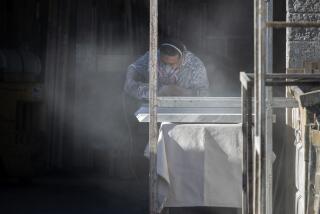Suits Over On-Job Injuries Curbed
- Share via
SAN FRANCISCO — Someone who hires a contractor to perform dangerous work is not liable if employees covered by workers’ compensation insurance are hurt or killed on the job, the California Supreme Court decided Thursday.
The court, in a 6-0 vote, said employees or their survivors in such situations can collect only workers’ compensation benefits, even if the hirer failed to make sure the contractor was qualified for the work. Workers’ compensation usually pays a fraction of what victims could receive in a lawsuit.
“The hirer should not have to pay for injuries caused by the contractor’s negligent performance, because the workers’ compensation system already covers those injuries,” Justice Janice Rogers Brown wrote for the court.
The ruling, like previous state Supreme Court decisions, further restricts the ability of employees of contractors, or their relatives, to sue third parties for workplace injuries.
Thursday’s decision in Camargo vs. Tjaarda Dairy, S088632, resulted from a lawsuit brought by the widow and five children of Alberto Camargo, a laborer who died in a 1996 tractor accident in Kern County.
Eva Camargo and her family sued Tjaarda Dairy on the grounds that it had negligently hired a contractor to remove manure. The suit charged that the dairy had failed to determine whether Camargo was qualified to operate the tractor safely. The dairy denied any negligence.
A Superior Court judge had dismissed the lawsuit, but the 5th District Court of Appeal in Fresno reinstated it on the grounds that the state Supreme Court had not specifically barred suits in cases that alleged negligent hiring.
Alberto Camargo died when his tractor rolled over as he was driving over a big mound of manure at the dairy. He was a full-time employee of Golden Cal Trucking, which the dairy had hired to scrape manure out of its corrals and haul it away in exchange for the right to buy the manure at a discount. The manure is sold to farmers for use as fertilizer.
Timothy A. Black, the lawyer who represented the Camargo family, said the tractor was not properly equipped with roll bars and safety restraints, making the contractor unqualified for the job.
“It is not realistic to think the marketplace is going to take care of worker safety, especially now that we have so many day laborers,” Black said. “We have to remember that a laborer has the choice of whom they are going to work for but not a choice of whom their employer is going to take a job from.”
Black said that he did not know how much Camargo and her children received from workers’ compensation, but that it was probably no more than $200,000.
The workers’ compensation system bars employees from suing their employers for on-the-job injuries and generally limits their recovery to medical expenses and lost wages.
John F. Petrini, who represented the Kern County dairy, said it would be unfair if the hirer were liable for substantial damages when the firm that employed the worker could not be sued.
“A contractor can be totally negligent and the bulk of the liability could fall on the person who hired that contractor, even though that person might not be negligent at all or hardly at all,” Petrini said.
Fred H. Hiestand, general counsel for the Civil Justice Assn. of California, a tort reform group, said the decision should encourage companies to obtain workers’ compensation insurance.
“If you get workers’ compensation, you can’t be sued for injuries to your employees,” Hiestand said. “If you don’t get it, it is open season on you.”
Until 1993, California courts allowed injured workers of contractors to sue firms that hired the contractors for work that was inherently dangerous. The court barred such suits that year and in a similar 1998 ruling. Two other cases that are pending before the court will determine whether there are any exceptions to the rule.
Frederick Baker, a lawyer for the American Chemistry Council, which argued for the dairy, said the ruling would apply even if the contractor lacked workers’ compensation insurance because the state would provide benefits under current law.
“The hirer of the independent contractor should still be protected,” he said.
Baker noted that the issue has not come up because licensed contractors are required to carry workers’ compensation insurance.
The Chemistry Council, a trade group that represents manufacturers of chemicals and chemical products, took part in the case because its members often use contractors to do dangerous work, the lawyer said.
More to Read
Inside the business of entertainment
The Wide Shot brings you news, analysis and insights on everything from streaming wars to production — and what it all means for the future.
You may occasionally receive promotional content from the Los Angeles Times.











